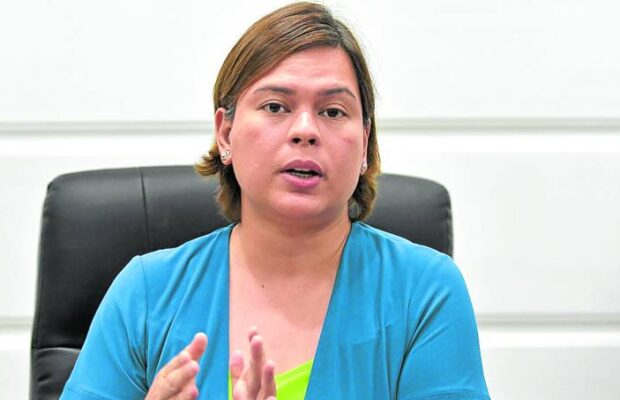Why Sara Duterte is ‘secondary respondent’ in ICC case
MANILA, Philippines — The testimony of a confessed hit man for the Davao Death Squad (DDS) served as the main basis for the inclusion of Vice President Sara Duterte as a “secondary” respondent in the crimes against humanity case pending before the International Criminal Court (ICC), according to former Sen. Antonio Trillanes IV.
Speaking to the Inquirer over the phone on Tuesday, Trillanes said that Arturo Lascañas, a retired police officer in Davao City, implicated Sara as having had a role in the extrajudicial killings (EJKs) when she took over the mayoral duties in 2010 from her father, Rodrigo Duterte, and “agreed to continue” the “tokhang” approach.
However, Sara, in a statement on Tuesday, said that not once during her term as Davao City mayor and vice mayor was she linked with the DDS.
“But after I won as Vice President, all of a sudden, there was a witness against me and now, I am one of the accused in the [ICC],” she said in Filipino. “I don’t need a death squad for the things I am capable of doing.”
Addressing queries for the first time on her inclusion in the list of respondents in the ICC case, Sara maintained that she would face any charges only before judges and courts in the Philippines, denouncing any foreign intervention in dealing with the cases surrounding the deaths recorded during her father’s war on drugs.
She emphasized that she would not participate in any foreign intervention on the cases related to the drug war deaths, describing it as something that would “not only bring down the country to embarrassment and shame but will also shatter the dignity of our country’s judges, courts and the whole justice system.”
Documentary evidence
According to Trillanes, Sara Duterte was not initially a respondent in the complaint, but when the ICC conducted its own inquiry, “she was eventually included because there were testimonies” that would bolster claims of her role in the killings perpetrated in the city under her leadership.
“When Sara was elected mayor of Davao… [the] DDS was directed by then Vice Mayor Rodrigo [Duterte] to get clearance from the new Mayor Sara on whether she would still continue with the extrajudicial approach of her father, the former mayor,” Trillanes said, citing Lascañas’ sworn statement to the ICC.
“And when they [the DDS] did, they met with her personally and she agreed to continue with EJKs,” he continued.
The former senator noted that this was backed by documentary evidence in the case lodged before the Hague-based court.
“That’s why if you will track the rate of death during the time of (Sara’s) term as mayor, the number of deaths did not decline, it remained the same,” Trillanes said.
Sara was first elected Davao City mayor in 2010 before her father assumed the post again from 2013 to 2016. Sara was reelected mayor of Davao in 2016, while her father won the presidential election.
Duterte’s war on drugs left at least 6,000 people dead, according to official data. However, independent monitoring by human rights groups put the number of fatalities at around 20,000.
